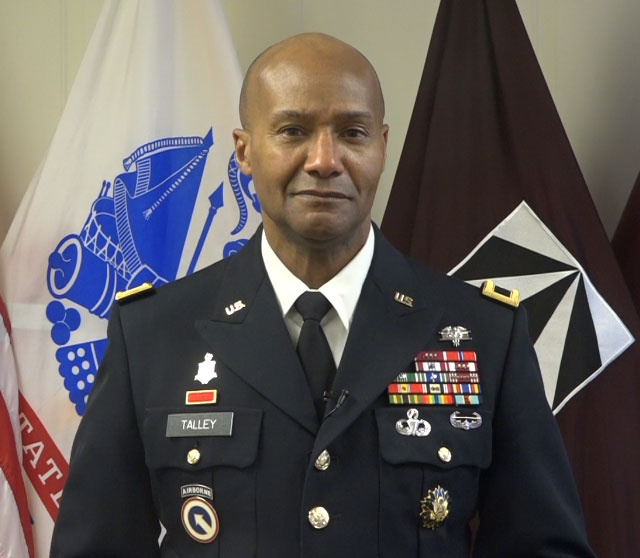Talley, Others Talk Partnerships, Progress at SMART PROC

Brig. Gen. Michael Talley, commander of the U.S. Army Medical Research and Development Command and Fort Detrick, laid out a clear, concise vision for the future of military medical innovation during his keynote speech at the annual "Strengthening the Mid-Atlantic Region for Tomorrow Procurement Conference" event on January 22.
"As a Command and an Installation, we look for opportunities like SMART PROC to engage with relevant businesses to discover if their core capabilities align with our Mission requirements," said Talley via taped remarks during the online event. "I don't think we've had a clearer direction during my three decades of service."
Talley's opening remarks set the tone for the rest of his speech, which was designed to not only explain the mission and vision of USAMRDC but also the general process by which attendees can work with the federal government to achieve those ends. Held in an online-only environment to accommodate safety protocols enacted as a result of the ongoing novel coronavirus pandemic, SMART PROC is noted for its ability to create unique partnerships and contracting pathways for the benefit and support of both USAMRDC and the larger U.S. Department of Defense.
Contracts devoted to small businesses specifically make up an ever-increasing amount of DOD efforts, with Fort Detrick alone serving as the source for more than one billion dollars in total federal contracts; a fact noted by SMART PROC speaker and Frederick County Executive Jan Gardner. Overall, federal contracting accounts for ten percent of the entire gross domestic product of the state of Maryland.
"It's through small-business partnerships that we can reach our goals more efficiently," said Talley. "The business community helps us to fulfill our role as a leader of medical research and development – which in the end, contributes to our national security."
Delivering the keynote address at SMART PROC for the second year in a row, Talley focused the majority of his speech on current Army and Command priorities – specifically the need for technological innovation and its increasing role in Soldier resilience. Given the continuing national focus on COVID-19, Talley also spent time discussing USAMRDC's role in fighting the pandemic, specifically mentioning the development of the COVID-19 Airway Management Isolation Chamber; a unique, low-tech device created by Army doctors and USAMRDC engineers – one made from basic PVC piping, plastic sheeting, and a vacuum line – to provide additional protection to healthcare workers when treating COVID-19 patients. The CAMIC is widely seen as a victory for USAMRDC Technology Transfer team, as it only took mere months to progress from an idea to a full-fledged product. Last year, the U.S. Food and Drug Administration granted the CAMIC an Emergency Use Authorization to expedite its use on a larger scale. Said Talley, "As we continue to use these pathways to develop solutions for the Warfighter, we will continue our collaboration with local businesses to develop, acquire, integrate, and sustain medical technology solutions for both the military and the civilian market."
In addition to Talley, additional USAMRDC representatives made a series of presentations during the SMART PROC "Super Session" event; a lengthy breakout meeting focusing chiefly on the specifics of partnering with the Command while offering in-depth explanations of the kinds of technologies the USAMRDC is looking to procure.
"We cover the gamut from very early stage basic research all the way through product development and then procurement and fielding to the Force," said Mark Dertzbaugh, USAMRDC Acting Principal Assistant for Research and Technology, during a presentation highlighting the need for products related to medical readiness, cognitive and physical performance, and brain injury. "We certainly have opportunities and resources available to help you develop your technology."
Said Jerome Maultsby, Assistant Director of the USAMRDC Office of Small Business Programs (OSBP), who also spoke at SMART PROC, "As an Army team, we remain committed to utilizing these types of outreach events to help maximize opportunities for innovative and relevant small business firms."
The event marked the 18th iteration of the SMART PROC event. USAMRDC has participated in each SMART PROC since the event's inception in 2002.
 An official website of the United States government
An official website of the United States government
 ) or https:// means you've safely connected to the .mil website. Share sensitive information only on official, secure websites.
) or https:// means you've safely connected to the .mil website. Share sensitive information only on official, secure websites.


